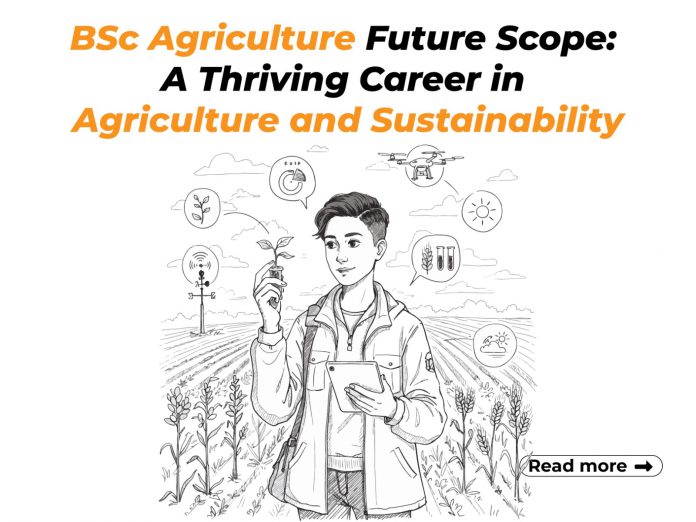The bsc agriculture scope is rapidly expanding with the global shift towards sustainable practices and food security. With modern technology being integrated into traditional farming methods, the bsc agriculture future scope offers incredible career opportunities. From agribusiness and research to sustainable farming and government services, the career scope in bsc agriculture is both diverse and impactful, making it one of the most rewarding fields for science students after 12th.
Why Choose BSc Agriculture?
Choosing a degree in agriculture today means becoming part of a future-focused, innovation-driven sector. The bsc agriculture career scope spans across core agricultural science and new-age domains like precision farming and agro-technology.
- Sustainability-Centric Field: Agriculture professionals play a direct role in promoting environmental sustainability and food security.
- Diverse Job Profiles: The scope after b sc agriculture includes agronomist, food technologist, agricultural officer, and even data analyst in agri-tech firms.
- Ever-Growing Demand: With a global population increase, there is always demand for skilled professionals in agriculture.
- Government and Private Sector Roles: The b sc agriculture scope in future includes lucrative job opportunities in public sectors (ICAR, NABARD, FCI) and private agribusiness firms.
Core Areas and Emerging Domains in BSc Agriculture
A BSc in Agriculture is more than just traditional farming. It offers deep insights into scientific methods, innovation, and industry practices. The bsc agriculture scope widens through multiple disciplines:
| Domain | Description |
| Agronomy | Scientific study of crop production and soil management. |
| Horticulture | Cultivation of fruits, vegetables, and ornamental plants. |
| Soil Science | Analysis and treatment of soil for better yield. |
| Plant Pathology | Study of diseases in plants and their biological solutions. |
| Agricultural Economics | Application of economics in farming and agribusiness. |
| Agri-Tech & Precision Farming | Use of technology like drones, AI, and IoT in farming. |
| Agricultural Biotechnology | Genetic modification and innovation in crops. |
| Sustainable Agriculture | Eco-friendly practices for long-term productivity. |
Career Scope After BSc Agriculture
The career scope in bsc agriculture is vast and multidimensional. With a blend of fieldwork, research, and modern technology, graduates find meaningful and stable roles across various domains.
| Job Role | Description |
| Agricultural Officer | Works with government departments to implement agri-policies. |
| Farm Manager | Oversees the entire operation of large farms or estates. |
| Agri-Entrepreneur | Launches startups in organic farming or food processing. |
| Agricultural Scientist | Works in research and innovation under ICAR or private firms. |
| Soil & Plant Analyst | Conducts lab testing to improve farming efficiency. |
| Agri Marketing Executive | Promotes farm equipment, seeds, and fertilizers. |
| Crop Consultant | Advises farmers on productivity, pest control, and soil management. |
| Seed Technologist | Specializes in hybrid seed production and quality control. |
Top Recruiters and Industries for BSc Agriculture Graduates
The b sc agriculture scope in future is evident from the increasing demand across government, corporate, and startup ecosystems.
| Sector | Examples |
| Government Agencies | ICAR, NABARD, FCI, IFFCO, State Agriculture Departments |
| Agri-Tech Startups | DeHaat, AgroStar, CropIn, Ninjacart |
| FMCG & Agri-Input Companies | ITC, Godrej Agrovet, Bayer, Amul, Mahindra Agribusiness |
| Banks & Finance Institutions | SBI, NABARD, HDFC Rural Finance |
| Export Houses | Fresh Produce Export Firms |
| Research & Development | Agricultural Universities, Krishi Vigyan Kendras |
The Future is Green: Upcoming Trends in Agriculture
The bsc agriculture future scope is closely linked with evolving global trends and digital transformation in farming.
- Digital Agriculture & AI: Precision farming using drones, sensors, and satellite data.
- Climate-Smart Farming: Techniques to handle crop production in changing climates.
- Organic & Vertical Farming: Rapid growth of chemical-free, space-efficient farming.
- Agri-Biotechnology: Innovations in genetically modified crops and biopesticides.
- Agri-FinTech Integration: Digital solutions for farm credit, insurance, and investments.
Higher Education & Certifications After BSc Agriculture
Further education significantly enhances the bsc agriculture career scope. Many students pursue postgraduation to specialize or move into research roles.
| Pathway | Options |
| Master’s Programs | MSc Agriculture, MBA in Agribusiness, MSc Agronomy, MSc Horticulture |
| Doctoral Research | PhD in Plant Breeding, Soil Science, or Biotechnology |
| International Degrees | Master’s in Sustainable Agriculture |
| Certifications | Remote Sensing in Agriculture, Organic Farming, Agribusiness Management |
| Competitive Exams | ICAR-JRF, UPSC (IFS), State PSCs, IBPS AFO |
Why Does ICAR Approval Matters?
An ICAR-approved college is an educational institution recognized by the Indian Council of Agricultural Research (ICAR) for meeting the national standards of agricultural education and research. ICAR is the apex body for coordinating, guiding, and managing agriculture education and research in India. Approval from ICAR ensures that the college follows a standardized curriculum, has qualified faculty, and offers modern infrastructure for practical learning and innovation.
Graduating from an ICAR-recognized institution adds credibility to your degree and enhances career prospects, especially in government sectors, research organizations, and international studies.
Lovely Professional University (LPU) is accredited by the Indian Council of Agricultural Research (ICAR), making it the first private university in India to receive this recognition. This accreditation applies to the LPU School of Agriculture.
How to Build a Career in Agriculture
- Strengthen Academic Concepts: Focus on subjects like agronomy, plant breeding, and soil science.
- Participate in Internships: Gain practical exposure through internships at research centers or agri-tech firms.
- Stay Updated with Agri Trends: Follow government schemes, market news, and tech innovations.
- Attend Workshops & Seminars: Enroll in programs by ICAR, FAO, or Krishi Vigyan Kendras.
- Build a Strong Network: Connect with alumni, professors, and industry professionals.
- Prepare for Competitive Exams: Target ICAR, UPSC, or IBPS for government roles.
- Work on Projects: Undertake field research or agri-entrepreneurship projects.
- Choose a Specialization: Identify your interest in areas like biotech, sustainability, or policy.
- Create a Professional Portfolio: Include projects, internships, and certifications.
10. Explore Global Opportunities: Look for exchange programs or higher studies abroad.
FAQs
1. What is the bsc agriculture future scope in India?
India’s agri-sector is the backbone of the economy, offering growing opportunities in agri-tech, agribusiness, and government roles.
2. Is BSc Agriculture a good career option?
Yes, due to high demand in both government and private sectors, BSc Agriculture offers great stability and growth.
3. What are the top careers after BSc Agriculture?
Agricultural Officer, Agri-Entrepreneur, Scientist, Farm Manager, and Consultant are among the top roles.
4. Can I pursue MBA after BSc Agriculture?
Absolutely. An MBA in Agribusiness is a popular and rewarding option.
5. What is the scope after b sc agriculture abroad?
Global demand for sustainable agriculture and organic farming has created roles for Indian graduates in countries like Canada, Australia, and the EU.
Conclusion
The bsc agriculture scope is no longer confined to traditional farming. With growing emphasis on sustainability, climate resilience, and food security, the b sc agriculture scope in future is brighter than ever. Whether it’s research, agribusiness, or digital farming, the career scope in bsc agriculture offers immense potential. For students passionate about nature, sustainability, and innovation, BSc Agriculture is not just a degree—it’s a movement towards a greener, smarter future.




![Career Paths After B.Sc. Information Technology [Lateral Entry] Career Paths after B.Sc. Information Technology [Lateral Entry]](https://www.lpu.in/blog/wp-content/uploads/2026/01/Career-Paths-after-B.Sc_.-Information-Technology-Lateral-Entry-218x150.png)









